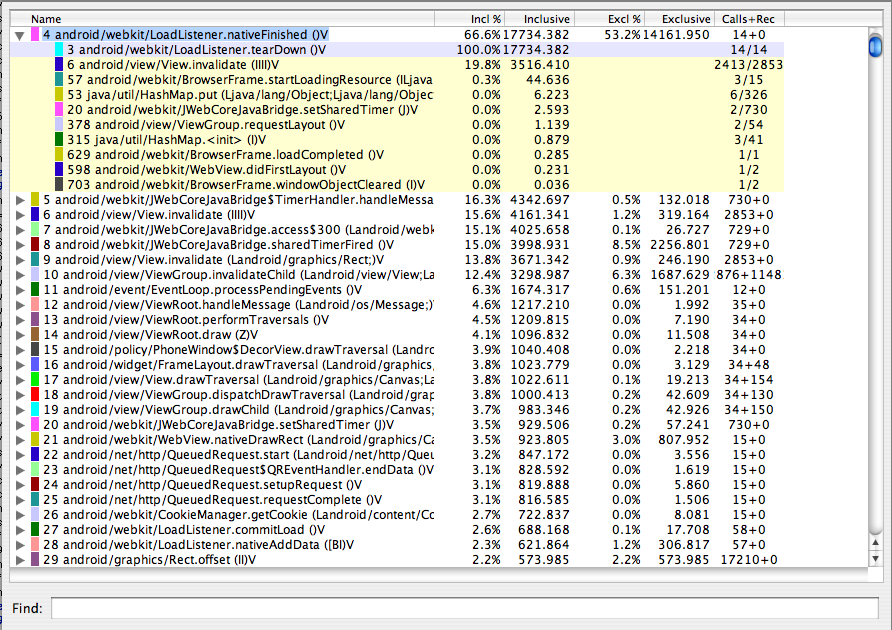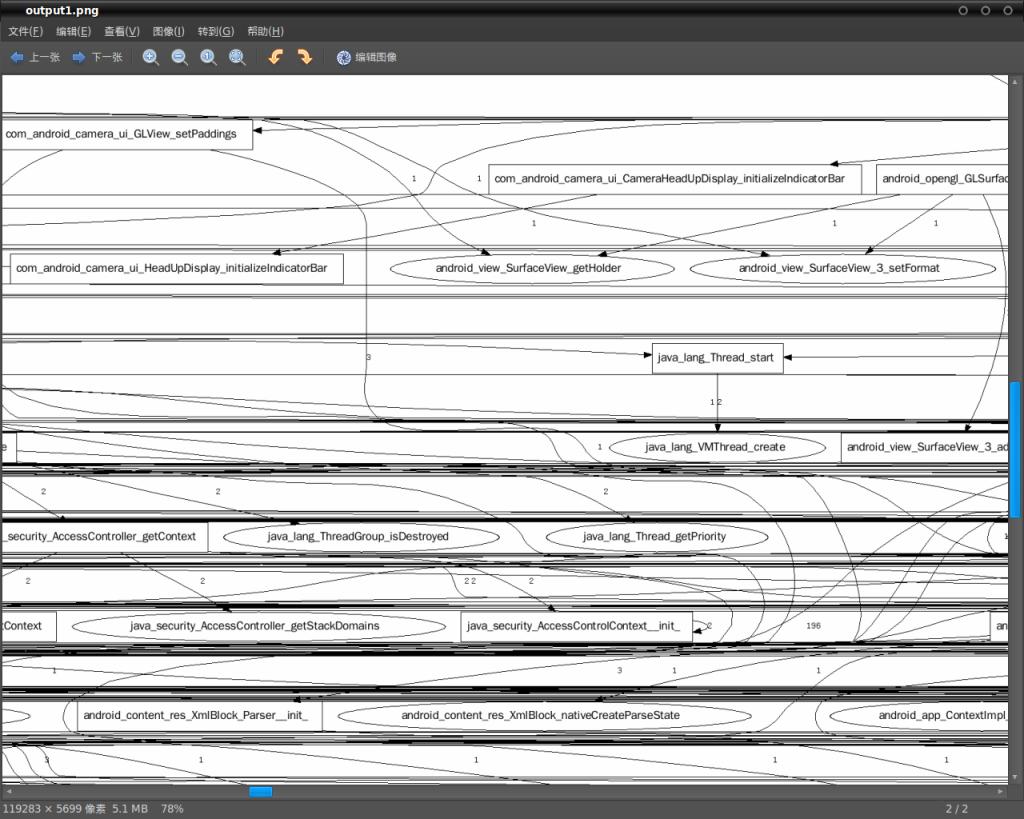[Android]Android代码调试工具: Traceview和Dmtracedump
✿Android 程序调试工具
Google为我们提供的代码调试工具的亮点:traceview 和 dmtracedump 。有了这两个工具,我们调试程序分析bug就非常得心应手了。traceview帮助我们分析程序性能,dmtracedump生成函数调用图。遗憾的是,google提供的dmtracedump是个失败的工具,并不能绘图,本文会详细介绍解决方案,实现绘图。
✿生成.trace文件
android.os.Debug类,其中重要的两个方法Debug.startMethodTracing()和Debug.stopMethodTracing()。这两个方法用来创建.trace文件,将从Debug.startMethodTracing()开始,到Debug.stopMethodTracing()结束,期间所有的调用过程保存在.trace文件中,包括调用的函数名称和执行的时间等信息。
把下面代码分别在加在调试起始代码的位置,和终止位置。
- Debug.startMethodTracing(“test”);
- Debug.stopMethodTracing();
其中参数test是要创建的trace文件的名称,test.trace。默认路径是/sdcard/test.trace,也可以自己制定/data/log/test,表示文件在/data/log/test.trace。
✿traceview
在SDK中执行 :
./traceview test.trace
我们可以得到
1.程序中每个线程调用方法的启动和停止时间

2.函数执行的信息和效率分析

✿dmtracedump
dmtracedump原本的用意是将整个调用过程和时间分析结合,以函数调用图的形式表现出来。可是google这个项目一直处于broken状态,迟迟不能得到完善。现在的dmtracdump只有-o选项可以使用,在终端上列出函数调用信息,和traceview功能相似,如果执行./dmtracedump –g test.png test.trace就会卡住不动。
起初我以为是test.trace文件的问题,对文件的结束符稍作修改,画出了一副雷人的图片:

后来,搜到了网络上有牛人提供了dmtracedump的替代(这是原文链接),是一个python脚本,借助dot来绘制矢量图。python脚本一定要注意对齐格式,对齐缩进就是他的逻辑结构。
- #!/usr/bin/env python
- """
- turn the traceview data into a jpg pic, showing methods call relationship
- """
- import sys
- import os
- import struct
- import re
- ################################################################################
- ######################## Global Variable #####################################
- ################################################################################
- target_thread=1 #the thread that we want to track, filt out other threads
- #all_actions = ["enter","exit","exception","reserved"]
- all_threads = {}
- all_methods = {}
- all_records = []
- parent_methods = {}
- child_methods = {}
- method_calls = {}
- ################################################################################
- ############################## Methods #####################################
- ################################################################################
- def add_one_thread(line):
- fields = line.split("/t")
- all_threads[int(fields[0],10)]=fields
- def add_one_method(line):
- fields = line.split("/t")
- all_methods[int(fields[0],16)]=fields
- def add_one_record(one):
- thread_id,=struct.unpack("B",one[:1])
- if (thread_id == target_thread):
- tmp,=struct.unpack("L",one[1:5])
- method_id= (tmp / 4) * 4;
- method_action= tmp % 4;
- time_offset,=struct.unpack("L",one[5:])
- all_records.append([thread_id, method_id, method_action, time_offset])
- def handle_one_call(parent_method_id,method_id):
- if not (parent_methods.has_key(parent_method_id)):
- parent_methods[parent_method_id]=1
- if not (child_methods.has_key(method_id)):
- child_methods[method_id]=1
- if method_calls.has_key(parent_method_id):
- if method_calls[parent_method_id].has_key(method_id):
- method_calls[parent_method_id][method_id]+=1
- else:
- method_calls[parent_method_id][method_id]=1
- else:
- method_calls[parent_method_id]={}
- method_calls[parent_method_id][method_id]=1
- def gen_funcname(method_id):
- r1=re.compile(r'[/{1}lt;>]')
- str1=r1.sub("_",all_methods[method_id][1])
- str2=r1.sub("_",all_methods[method_id][2])
- return str1+"_"+str2
- def gen_dot_script_file():
- myoutfile = open("graph.dot", "w")
- myoutfile.write("digraph vanzo {/n/n");
- for one in all_methods.keys():
- if parent_methods.has_key(one):
- myoutfile.write(gen_funcname(one)+" [shape=rectangle];/n")
- else:
- if child_methods.has_key(one):
- myoutfile.write(gen_funcname(one)+" [shape=ellipse];/n")
- for one in method_calls.keys():
- for two in method_calls[one]:
- myoutfile.write(gen_funcname(one) + ' -> ' + gen_funcname(two) + ' [label="' + str(method_calls[one][two]) + '" fontsize="10"];/n')
- myoutfile.write("/n}/n");
- myoutfile.close
- ################################################################################
- ########################## Script starts from here #############################
- ################################################################################
- if len(sys.argv) < 2:
- print 'No input file specified.'
- sys.exit()
- if not (os.path.exists(sys.argv[1])):
- print "input file not exists"
- sys.exit()
- #Now handle the text part
- current_section=0
- for line in open(sys.argv[1]):
- line2 = line.strip()
- if (line2.startswith("*")):
- if (line2.startswith("*version")):
- current_section=1
- else:
- if (line2.startswith("*threads")):
- current_section=2
- else:
- if (line2.startswith("*methods")):
- current_section=3
- else:
- if (line2.startswith("*end")):
- current_section=4
- break
- continue
- if current_section==2:
- add_one_thread(line2)
- if current_section==3:
- add_one_method(line2)
- #Now handle the binary part
- mybinfile = open(sys.argv[1], "rb")
- alldata = mybinfile.read()
- mybinfile.close()
- pos=alldata.find("SLOW")
- offset,=struct.unpack("H",alldata[pos+6:pos+8])
- pos2=pos+offset #pos2 is where the record begin
- numofrecords = len(alldata) - pos2
- numofrecords = numofrecords / 9
- for i in xrange(numofrecords):
- add_one_record(alldata[pos2 + i * 9:pos2 + i * 9 + 9])
- my_stack=[0]
- for onerecord in all_records:
- thread_id=onerecord[0];
- method_id=onerecord[1];
- action=onerecord[2];
- time=onerecord[3];
- if(action==0):
- if(len(my_stack) > 1):
- parent_method_id=my_stack[-1]
- handle_one_call(parent_method_id,method_id)
- my_stack.append(method_id)
- else:
- if(action==1):
- if(len(my_stack) > 1):
- my_stack.pop()
- gen_dot_script_file()
- os.system("dot -Tjpg graph.dot -o output.jpg;rm -f graph.dot");
修改,/t变为\t,/n变为\n。
在计算器的源码onCreate中添加
- Debug.startMethodTracing(“calc”);
- Log.v(LOG_TAGS”+++++++++++++++++++++++++test++++++++++++++++”);
- Debug.stopMethodTracing();
运行脚本得到calc.trace ,画出out.jpg

可当得到的trace文件比较复杂时画图就会崩溃。修改脚本最后执行dot命令时的参数,jpg格式太大容易崩溃,-Tjpg改为-Tpng:gd,画大幅png。
我拿camera做了个实验,得到的png甚大,这是其中一角:
我拿camera做了个实验,得到的png甚大,这是其中一角:




 浙公网安备 33010602011771号
浙公网安备 33010602011771号